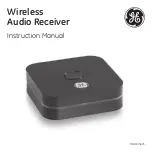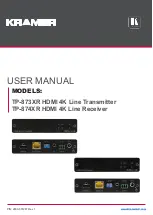
22
OPERATING THE TUNER
PRESET SELECTION
When you want to listen to the tuner you
must first select it as the current auditioning
source. This is done by pressing the
button repeatedly until the word
'TUNER'
appears on the screen.
The system can store a total of 60 station pre-
sets. The preset stores the frequency together
with the other tuner settings (
MONO
/
STEREO
,
ATTENUATOR
etc.)
(see
Chapter "Storing and erasing presets")
.
When you call up a preset the tuner reverts to
the exact setting in which the preset was sto-
red.
Pressing the
button briefly calls up
the next stored tuner preset (in ascending
order). If you hold the button pressed in for
longer than one second, the tuner jumps back
to the preceding preset.
If you continue to hold the
button
pressed in, the tuner continuously jumps back
to the previous preset number until you re-
lease the button. Empty memory spots are
automatically skipped.
Note:
If you select a preset and the new station is
broadcasting RDS information, the screen
displays the station's name. Otherwise the
screen shows the new preset number and the
reception frequency. After about a second the
preset number is replaced by a tuning indi-
cator.
TUNER DISPLAY ELEMENTS
STEREO INDICATOR
This symbol lights up if the station you have
selected is broadcasting a stereo signal.
The indicator does not light up if the trans-
mission is in mono, or if the tuner has been
set manually to MONO reception mode -
'RCVM MONO'
(
see Tuner special functi-
ons).
SIGNAL STRENGTH INDICATOR
This symbol helps you to judge the signal
strength and the quality of reception you can
expect from the selected station. If the sym-
bol lights up, hiss-free MONO reception is
available. The stereo signal may have slight
background hiss.
Note:
The tuner is fitted with an
automatic High
Blend circuit
. When a stereo signal of ina-
dequate field strength is picked up, this cir-
cuit reduces the base width of the stereo sig-
nal and thereby reduces the background hiss.
















































